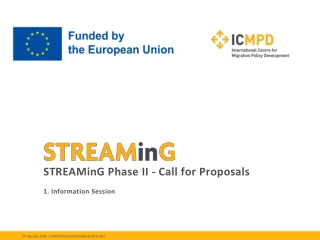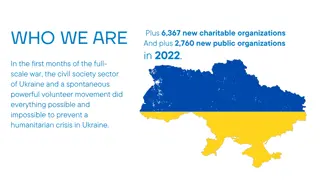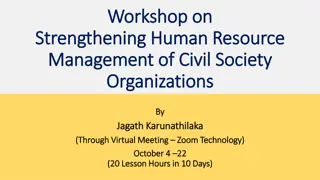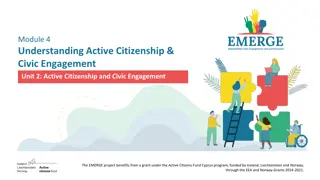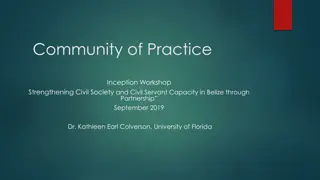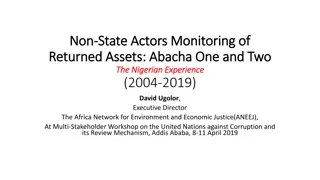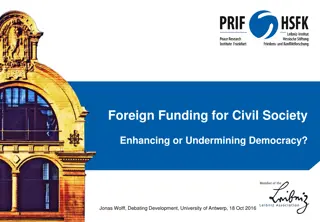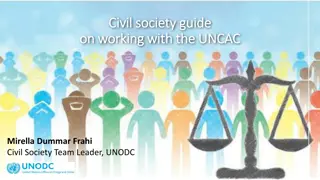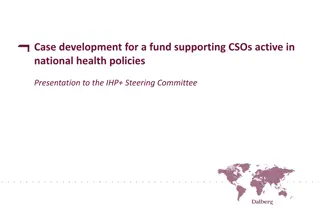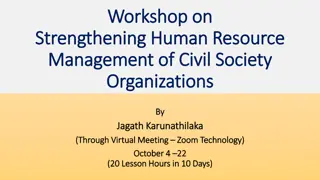Preparing International Civil Society Organizations for Future Challenges
International Civil Society Organizations (ICSOs) are actively assessing and responding to longer-term trends and potential disruptions. Findings from a survey and interview series conducted among ICSOs reveal key areas of focus, including rising inequality, demographic shifts, climate change, and the future of technology. Additionally, ICSOs are monitoring wider environmental, social, economic, operational, and political trends to prepare for the evolving landscape. The study aims to serve as a benchmark and foster sector-wide discussion on readiness for change.
Download Presentation

Please find below an Image/Link to download the presentation.
The content on the website is provided AS IS for your information and personal use only. It may not be sold, licensed, or shared on other websites without obtaining consent from the author.If you encounter any issues during the download, it is possible that the publisher has removed the file from their server.
You are allowed to download the files provided on this website for personal or commercial use, subject to the condition that they are used lawfully. All files are the property of their respective owners.
The content on the website is provided AS IS for your information and personal use only. It may not be sold, licensed, or shared on other websites without obtaining consent from the author.
E N D
Presentation Transcript
Scanning theHorizon Analysingtrends, spottingdisruptionandamplifying ICSO potential Getting ready for the future: How international civil society organisations are preparing Findings from a survey and interview series among international CSOs, December 2017 February 2018
Getting ready for the future: Findings from a mapping among ICSOs Goal: Stock-take of what ICSOs do to prepare for change: how do they assess and respond to trends & disruption To serve as a benchmark To foster discussion in the sector Online survey: Open 05 Dec 2017 31 Jan 2018; open & closed questions Invitation via email and social media 25 participants: 18 ICSOs, 7 platforms; mostly senior management, 2 senior leaders Interviews: Feb 2018 6 semi-structured interviews, from out of respondents
Scanning: Most frequently quoted longer-term trends & potential disruptions (open question, brackets: number of mentions) Rising inequality (11) Demographic shifts | Urbanisation | Future of development finance (9) Climate change | Rise of nationalism and populism (6) Future of technology | Disintermediation (5) Shifts in global power | Digitalisation | Migration | Closing civic space (4)
Scanning: What other longer-term trends & potential disruptions ICSOs see Wider environment In development / humanitarian / ICSO sector Social: Religious polarisation Women s and girls sexual and reproductive health and rights Everyday activist Changes in family composition Localisation Changing EU/UK AID and Development Policy Increased need for evidence-based advocacy work Growing vulnerability amongst beneficiaries Universal Health Coverage De-institutionalisation of child-care Greater public/political awareness of CSOs target groups Economic: Rise of MIC Role of China Future of work Operational: From project-based management to new forms of engagement Accountability, transparency Blurring sectors / hybrid models Changing employee expectations More part-time and project-based short-term employment Greater need for innovative, flexible, specialised staff Public trust in charity Environmental: Environmental degradation Resource scarcity Political: Eroding public trust, values under pressure Media polarisation Brexit
So what?: Most frequently quoted longer-term actions Working more in partnerships and coalitions Diversifying sources of income and developing new business models Becoming more agile and innovative as an organisation Better communicating impact More deeply engaging with supporters and new constituencies Stepping up technical expertise in the organisation s core field of work, or technological capacities to better master the digital revolution Refocus the organisation s activities more geographically or thematically Expanding advocacy and influencing work to drive systemic change Engaging existing volunteers/membership in bridging societal divides Moving towards more flexible planning routines
Political developments & events to watch in the short term Domestic politics especially Brexit, UK government stability, US legislative agenda and mid-term elections and their effects on international development, specifically funding Closing civic space Nationalism, the potential rise of new nationalist/populist leaders Deepening isolationism and crisis of multilateralism More wars including risk of global conflict, terrorism and instability Migration and shifts in associated EU politics.
Findings Digitalisation and Future of technology like black box: little account of which technologies and impacts on work organisations have identified as priority. A number of trends ICSOs mention as significant for their future seem to remain by and large unacted upon. Technology and digitalisation Continued closing of civic space Urbanisation Little concrete action to brace for these changes, let alone a systematic response. By comparison, most developments relating to funding or modes of delivery and organisational short-term challenges seem to induce more targeted responses.
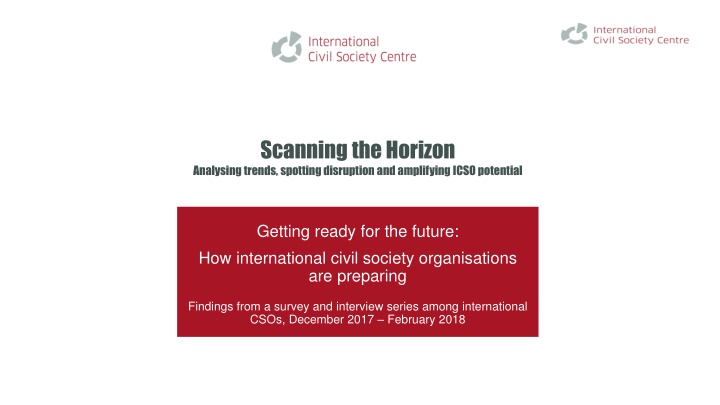

![❤[PDF]⚡ Civil War Talks: Further Reminiscences of George S. Bernard and His Fel](/thumb/20551/pdf-civil-war-talks-further-reminiscences-of-george-s-bernard-and-his-fel.jpg)
